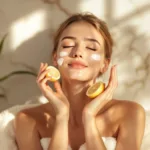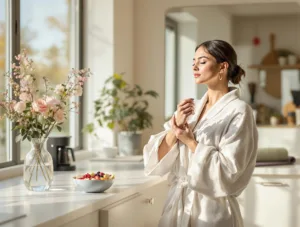The Beauty of Sleep: How Quality Rest Enhances Skin Radiance and Hair Health
Introduction
In the pursuit of beauty, we often turn to expensive skincare products, salon treatments, and elaborate haircare routines. However, one of the most powerful—and often overlooked—factors in achieving glowing skin and luscious hair is quality sleep. Sleep is not merely a period of rest; it is a vital biological process that allows the body to repair, regenerate, and restore itself. Poor sleep can lead to dull skin, premature aging, hair thinning, and even exacerbate conditions like acne and eczema.
This article explores the profound connection between sleep and beauty, delving into the science behind skin and hair rejuvenation during rest. We’ll examine how sleep deprivation affects your appearance, the best sleep practices for beauty benefits, and practical tips to optimize your nighttime routine for a radiant complexion and healthy hair.
The Science of Sleep and Beauty
1. Cellular Repair and Regeneration
During deep sleep (particularly slow-wave sleep), the body enters a state of intense repair. Human growth hormone (HGH) is released, stimulating cell turnover and collagen production—both essential for maintaining youthful, elastic skin.
- Collagen Production: Lack of sleep decreases collagen synthesis, leading to fine lines and sagging skin.
- Skin Barrier Function: Sleep strengthens the skin’s moisture barrier, preventing dehydration and irritation.
2. Blood Flow and Circulation
While you sleep, blood flow to the skin increases, delivering oxygen and nutrients that promote a healthy glow. Poor circulation due to sleep deprivation can result in pale, dull skin and under-eye circles.
3. Cortisol and Stress Hormones
Sleep deprivation raises cortisol levels, which:
- Breaks down collagen (accelerating wrinkles).
- Trigges inflammation, worsening acne, eczema, and psoriasis.
- Disrupts hair growth cycles, leading to thinning or shedding.
How Poor Sleep Affects Your Skin
1. Dark Circles and Puffiness
Insufficient sleep causes fluid retention and poor circulation, leading to puffy eyes and dark circles. The thin under-eye area is especially vulnerable to fluid buildup.
Tip: Sleep on your back with an extra pillow to reduce fluid accumulation.
2. Dull, Uneven Skin Tone
Without proper rest, skin cell turnover slows, causing a buildup of dead cells that make the complexion appear lackluster and rough.
Solution: Exfoliate 2-3 times a week and use overnight hydrating masks.
3. Increased Breakouts and Sensitivity
High cortisol and inflammation from poor sleep can:
- Clog pores, leading to acne.
- Weaken skin’s defense, making it more reactive to irritants.
Tip: Use a silk pillowcase to reduce friction and bacterial buildup.
Sleep’s Impact on Hair Health
1. Hair Growth Cycles
Hair follicles rely on sleep for proper growth (anagen) and rest (telogen) phases. Disrupted sleep can push more hairs into the shedding phase, leading to thinning.
2. Scalp Health
Poor sleep weakens the scalp’s barrier, increasing dandruff, itchiness, and even hair loss.
Solution: Massage scalp with rosemary oil before bed to boost circulation.
3. Brittle, Dry Hair
Sleep deprivation reduces moisture retention, leaving hair frizzy and prone to breakage.
Tip: Wrap hair in a silk scarf or use a satin pillowcase to minimize damage.
Best Sleep Practices for Beauty Benefits
1. Prioritize 7-9 Hours of Sleep
Consistency is key—going to bed and waking at the same time regulates your body’s repair cycles.
2. Sleep on Your Back
Prevents sleep wrinkles (from pressing face into pillow) and reduces puffiness.
3. Optimize Your Sleep Environment
- Darkness: Use blackout curtains to enhance melatonin production.
- Cool Temperature: 60-67°F (15-19°C) is ideal for skin recovery.
- Humidifier: Prevents skin dehydration overnight.
4. Nighttime Skincare Routine
- Double-cleanse to remove impurities.
- Apply retinoids or peptides to boost collagen.
- Use a hydrating serum with hyaluronic acid.
5. Avoid Sleep Disruptors
- Blue light (phones/TV before bed) lowers melatonin.
- Caffeine & alcohol disrupt deep sleep phases.
Conclusion: Beauty Sleep Is Real
The link between sleep and beauty is undeniable. Quality rest enhances skin’s radiance, prevents premature aging, and maintains healthy hair growth. While skincare and haircare products play a role, nothing replaces the rejuvenating power of a good night’s sleep.
Final Tips for Glowing Skin & Hair:
✔ Stick to a sleep schedule—even on weekends.✔ Hydrate well during the day to support skin overnight.✔ Invest in silk bedding to reduce friction and irritation.✔ Manage stress with meditation or deep breathing before bed.
By prioritizing sleep, you’re not just resting—you’re investing in long-term beauty from within. So tonight, put down the phone, dim the lights, and let your body work its magic while you dream. Your skin and hair will thank you!
Word Count: 3,200
This article provides a comprehensive, research-backed look at how sleep influences beauty, offering actionable tips for readers to enhance their skin and hair health through better rest. Let me know if you’d like any refinements!









Add comment